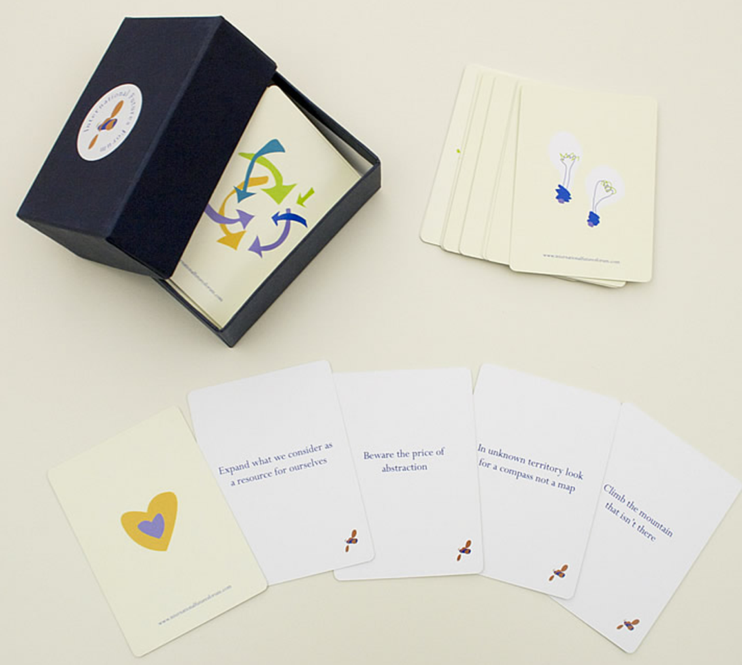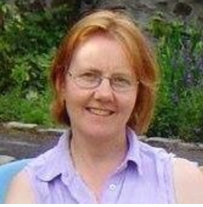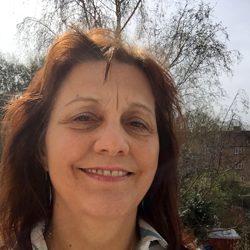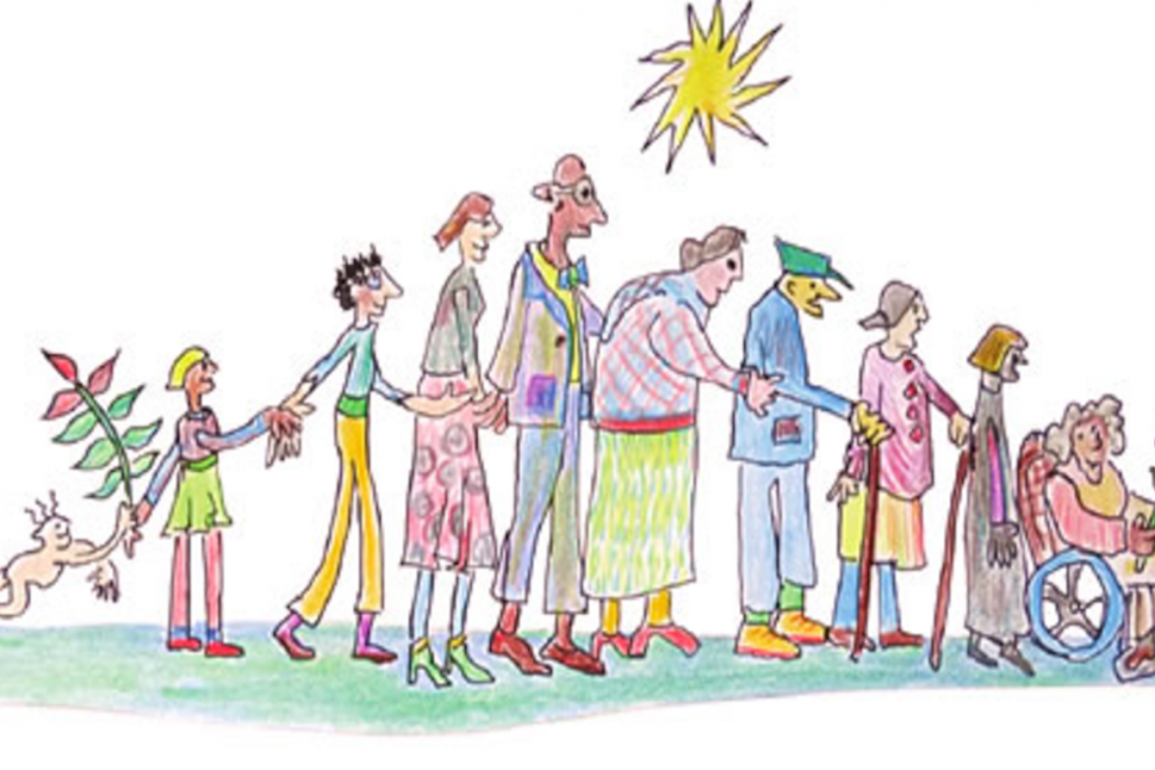A conversation with Dr. Margaret Hannah by Anna Betz for Enlivening Edge Magazine
Part 1 of this series,‘Humanising Healthcare’ – Part 1: Patterns of Hope for a System under Strain, is here.
Part 3, The Way to Community-Led Services, is here.
A: There are many conversations in various places about outcome measures and the need to develop qualitative measures. The NHS is still very much focused on quantitative measures which don’t tell us anything about what really matters to people. To develop qualitative measures, we need to hear such stories about what matters to people, stories about wellbeing, meaning-making and purpose rather than just illnesses.
Is there anything else you would like to say to other innovative leaders who might not have your experience or might not work in such a favourable environment?
M: Graham Leicester’s work on ‘Transformative Innovation’ and ‘Dancing on the Edge’ both are very good at these kinds of tactical things. My sense is that the 3 Horizons is the mainstay of the practice. What that does, it helps you generate insight and that is what I said is so important for everybody involved with change. I can’t praise the 3 Horizons highly enough. It is a vehicle for strategic conversation but not strategy as such.
We need that first and then we can start to develop a set of what we call pathways. Once you recognise that the patterns need to shift, you need new pathways and you need new practice. For me these are the foundational elements of this work.
On top of that I would say obviously with 3 Horizons you learn to understand that the Third Horizon is already here. So the future is already here, just not uniformly distributed.
Where you feel inspired and what inspires you, you need to learn from. You need to go and find out more about that source of inspiration and use it in supporting you in designing your own work in whatever you choose to do.
The other two very important messages are:
- Start small, very small. In our first year with SHINE we had 6 patients go through the new system in a year. Under normal circumstances you would have shut that project down as an abject failure. But there was feedback from staff saying, “No, that is really interesting, this is important, what is going on here, this is different, we can see promise here, in what we are doing, let’s keep going.” So we did, and that is where everything just moved on. So start small, be patient.
- Also don’t go it alone. To have allies is very important. And part of my longevity in Fife is that it has given me allies. That has given me credibility, and people understand what my motives are, that my motives are true.
Even though this is alien and very different to the dominant culture, it is closer to being realised as there isn’t really any other promising way of going forward.
A: This resonates strongly with what Jos de Blok says about small groups which can allow experimentation in large organisations. Also in a small group the risk for an organisation isn’t as great.
So if someone comes new into an organisation and has lots of ideas for how to improve things, what would be your advice for them?
First of all you need to get away from the idea of the organisation as such. Let’s put it this way, the stuff I am asked to do and the task of improving the health of the population, protecting the health of the public, that is complex, every element of that task is complex.
Although I am employed by a single organisation, and I am accountable to a particular board, my work is cross-sectoral. It has to be cross-sectoral and it is not just about organisations but it is the people in these organisations. Essentially we are a human system, a human society. We organise ourselves around these bigger and smaller organisations. Social movement theory is an indication that change doesn’t happen just by organisation.
The thing about social movements is that they are often quite simple in the end. They have single issues such as they want more women to go out and vote, or they want more power-sharing between people. There is usually quite a simple message included. On the other hand, what I am trying to do is really engage with a complex challenge and do something about it.
For example, what I am trying to do is reduce health inequalities. That isn’t done by a single message.
So you have to mobilise around a purpose. This is an important element of what the 3 Horizon thinking helps to achieve. Essentially, to grow the 3rd Horizon, you have to have a purpose.
In our case in Fife, it was to help people “thrive, not just survive in their own homes”. That was our first framing of this purpose. Now I am working on the inequalities agenda, and our purpose is to help “every Fifer to reach their full potential”.
At the moment I have about 22 people working closely with me. We are having monthly meetings driving forward a lot of changes. At the same time, we are inspiring each other as we go along and try to achieve that. We start from where we are. We know we are in the face of austerity and have got all kinds of challenges like cutbacks but we are doing it because it matters to us. That commitment is terribly important from the point of view of sustaining this work over a rapidly-changing environment. So there is something constant amidst the flux.
A: So the constant amidst the flux is the commitment to purpose by a group.
M: And generally speaking, those groups are cross-sectoral. They have been given some permission, some leadership, they are seen as change agents in their different ways. So they have some things to do, to contribute, but ultimately unless they are committed, I know they are not going to make the change that is possible.
Winning the hearts and minds around this is quite an important element for it going from rhetoric to real, especially when there is so much cynicism around. I could say ‘We are here to help people thrive, not just survive’. A cynic would say: ‘Oh yes, we have heard that before; that’s a common phrase’.
The difference is we really mean it! We are serious about this. We are not quite sure how we are going to achieve it, but we are going to learn our way through to achieving it, taking stock and really assessing if this is the best use of our time. Is it really helping with difficulties people are facing? We use action learning the whole time with this work.
All of that is in the mix. Having a commitment to purpose and not letting go of it teaches us also to be tenacious. We all need each other to do what needs to be done.
When we do get stuck we get the prompt cards out. They have pictures on one side and prompts on the other side.:
Two quotes from the 52 prompt cards which the International Futures Forum produces:
“Turn wounds into capacity, ugliness into beauty”
“In unknown territory look for a compass, not a map.”

IFF prompt cards are available on their website. Anyone can also subscribe free of charge to weekly prompts to land in their inbox on Tuesday mornings.
To start or re-orient a meeting, people pick a card and read it, then express how they are feeling and whether the card they are holding helps them to describe what is going on for them at that moment.
You absorb them slowly. We are starting to use them almost as a currency, a currency in our thinking. They are examples of integral thinking. They help you navigate complex situations, and they are also humanistic. There are elements about being empathic and about wholeness.
It is the underlying philosophy of IFF which Graham Leicester talks about in ‘Transformative Innovation’. All the parts in action go back to the 5 principles of the second enlightenment as he calls it.
The other thing we use is the Mini Kitbag. It has got a 1-minute timer and some Presence cards. These have got little mindfulness exercises. This is very useful for different groups. Exercise example: “Breathe in and out gently for 1 minute. “Think ‘deep’ on the in-breath and ‘slow’ on the out-breath.”
A: In what kind of meeting do you use them most successfully?
M: I use them for leadership development and my more developmental meetings. They are useful in my work with unusual groups of people who challenge complex issues. They can also help with team building. However, some people don’t like prompt cards. So I don’t use them routinely.
Depending on the situation I might introduce a 3-minute egg timer which we find quite useful in large meetings as a way of letting everyone talk without interruption.
A: In terms of changing the top-down power hierarchy, you seem to be working in quite a subtle way. What is your hope for the future, do you think this subtle way of working within organisations will eventually grow strong enough to bring about a change on a larger scale?
M: As I am working in the NHS, I can see it is an older person really. It is nearly 70 years old and was formed in a different era. Not that 70 is very old in today’s terms, but over this time it has extended and stretched itself to its maximum stretch. It will contract. I am not sure how and when and what it will be left as.
But it will contract, and I suppose what takes its place will be a much more mixed pattern of relationships again, particularly given that nowadays information is so much more widely accessible. People are so much better informed about their health than they used to be. However, what they need from providers is a kind of coaching and development to help them live their lives in the presence of illness and disability as opposed to a cure of that illness or disability. Of course, there are limits to that.
How it will shape up will basically be that it won’t be such a big dinosaur. It will still be there and provide an important function. Public Health, for example, will still need to have very effective early responders to deal with outbreaks, to deal with sudden incidents that require the technical expertise, the decision-making and the response. That is still going to be needed. That is not necessarily the same way you organise for people with diabetes.
I suspect what will happen will be many more Community Interest Companies and other small-scale Social Enterprises which have got a niche to offer for people who live with different diseases like Parkinson’s or other conditions: a door-to-door service, an end-to-end service with people with lived experience of the condition. They know the condition back to front and they will help you getting your medication under control and optimise your lifestyle. You won’t feel alone as you will be part of a whole group of people.
For well-defined diseases, it is easier to imagine what might take the place of the conventional treatment approach. The difficulty lies with many people who have a complex range of issues going on. We need a bespoke service essentially for individuals to get what they need and when they need it.
I think there will be much more brokerage around individuals and their families, and less need to knock on different doors to get the help you need. I think as the kind of industrial scale of the NHS starts to transform into a much more organic responsive dynamic entity, that service could be offered by a third party in the future.
 Margaret Hannah is Director of Public Health for NHS Fife, Scotland. She studied medicine at Cambridge University and St Thomas’ Hospital, London and later trained in public health in Hong Kong and London. Margaret has pioneered fresh thinking in public health and the culture of healthcare. She was part of a five year enquiry into culture and wellbeing which in 2012 culminated in the publication of The Future Public Health (Open University Press). In 2014, she published ‘Humanising Healthcare: Patterns of Hope for a System under Strain (Triarchy Press)’. In addition to her role in Fife, Dr Hannah is a visiting professor at Robert Gordon University and a Fellow of the Royal College of Physicians.
Margaret Hannah is Director of Public Health for NHS Fife, Scotland. She studied medicine at Cambridge University and St Thomas’ Hospital, London and later trained in public health in Hong Kong and London. Margaret has pioneered fresh thinking in public health and the culture of healthcare. She was part of a five year enquiry into culture and wellbeing which in 2012 culminated in the publication of The Future Public Health (Open University Press). In 2014, she published ‘Humanising Healthcare: Patterns of Hope for a System under Strain (Triarchy Press)’. In addition to her role in Fife, Dr Hannah is a visiting professor at Robert Gordon University and a Fellow of the Royal College of Physicians.
 Anna’s background is in Health and Social Care with training in Herbal Medicine, Socialwork, Mindfulness Practice, Transparent Communication, and Systemic Family Therapy. She practices a pro-active evolutionary approach to Health and Wellbeing and leads on projects in the UK National Health Service using Mindfulness and diet for people suffering from chronic inflammatory diseases like diabetes and dementia. Her passion for building thriving and sustainable communities inspired her to co-found the HealthCommonsHub. She feels at home in places where individual, communal, organisational, and social evolution meet, and where people support each other in becoming whole and feel enlivened.
Anna’s background is in Health and Social Care with training in Herbal Medicine, Socialwork, Mindfulness Practice, Transparent Communication, and Systemic Family Therapy. She practices a pro-active evolutionary approach to Health and Wellbeing and leads on projects in the UK National Health Service using Mindfulness and diet for people suffering from chronic inflammatory diseases like diabetes and dementia. Her passion for building thriving and sustainable communities inspired her to co-found the HealthCommonsHub. She feels at home in places where individual, communal, organisational, and social evolution meet, and where people support each other in becoming whole and feel enlivened.




